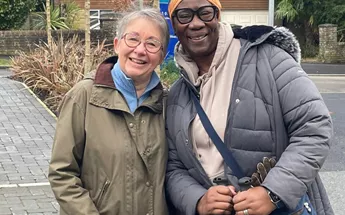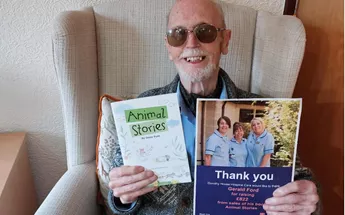Sammy's experience at Speedwell Court
Sammy uses her own words to describe her experience of staying at Speedwell Court dementia-friendly residential care home, reminding us of the importance the work that our care staff do, and the difference it makes not only to our residents, but their families too.
"I recently spent ten days in a care home. I wasn’t there as a resident or a care worker. I was there because my mother-in-law was on end-of-life care and I’d promised to be with her, to the end. My mother-in-law was in a care home because she had Vascular Dementia with Lewy Bodies and was no longer able to live independently. For our family this all happened very suddenly. Vascular Dementia with Lewy Bodies is a rapidly progressing form of Dementia.
"Less than a year before, my mother-in-law had been living in her own home with my father-in-law. As a family, we had some concerns about her memory and mobility, but it wasn’t until my father-in-law died that things began to unravel. They say that a family coping with Dementia is always playing, ‘catch up’ and the phrase describes our experience well, except we weren’t playing, it wasn’t a game. We moved my mother-in-law into a flat round the corner but a month later after a fall she ended up in hospital and from there, a care home.
"How do you choose a care home? I’d never had to choose a care home for someone before and, to be honest, had rarely visited one. Yet suddenly, here I was looking for a care home to get my mother-in-law out of hospital. I was impressed with the care home we found immediately. Abbeyfield care home Speedwell Court were quick to reply to my emails, phoned me to explain the process and empowered me with the knowledge I needed to advocate for my mother-in-law and get her out of hospital. When I walked in, I liked it immediately too.
"It didn’t look… or, I’ll be honest, smell, like the care homes my limited knowledge was aware of. It was bright, light, colourful and felt more like a hotel than a home. I loved that it was organised into ‘communities’ each with their own lounge and dining room. No institutional rows of chairs crowded round a television here. Every resident had their own brightly painted front door with a little light and a ‘memory window’ outside. Meals in the dining room were three courses complete with napkins and even wine!
"Daily activities went far beyond the usual sing along and film. Instead, there was pedal cycling taking residents to far flung places of the world via a screen, memory games, quizzes, visits from a pre-school, trips out and an amazing garden. The garden encouraged residents to grow, pick, cook and eat their own fruit and vegetables – oh, and there were chickens for my mother-in-law, who had always been independent, loved animals and gardens, it seemed perfect. When we visited, we noticed how the staff treated the residents with care, respect, and humour, and relatives too! We had no concerns and continued to be impressed.
"I took comfort from the fact that I knew, with absolute certainty, that her last six months truly had been spent in a home, surrounded by people who didn’t just care for her – they loved her."
— Sammy, daughter-in-law of former resident Margaret
"Visits are not the same as spending ten full days and nights in a care home. My time with my mother-in-law supporting her during her end-of-life-care was a privilege. It was a privilege to have that time with my mother-in-law, who I’d always been very close to, and a privilege to get an insight into life in a care home, particularly the challenging and complex role of a carer. We could so easily have felt in the way; but we never did. The staff at Speedwell Court made us feel welcome, they supported us so that we could support my mother-in-law. As we got to know the team some of them would even come in early to make us a cup of tea, knowing that we wouldn’t have had much sleep. The care home was such a special place, we were told that it was my mother-in-law’s home, and we should treat it as such; that whatever we’d have done in her own home, we could do with her there. Moreover, the staff told us that we inspired them; that seeing our care for my mother-in-law in her final days, inspired them in their work.
"And what work it was! I will admit, I was very ignorant about care work before my recent experience with a care home. As someone with a teaching and training background, I was guilty of thinking of care work as a lower paid, lower skilled job, not a profession. How wrong I was! During my time at Speedwell Court, I saw more and more similarities with teaching. Caring was and is such a skilled and demanding job. Just like teaching, caring involves long hours, lots of paperwork, planning, reviews, assessments, and behaviour management.
"I witnessed carers dealing with violent and aggressive behaviour, which was diffused with humour, gentleness, dignity… and yes, sometimes firm words. I witnessed carers missing breaks or using them to catch up on their record keeping and yet still managing to be patient, calm and professional with the residents. Professional is the word I would use to describe the carers I encountered. Working with people with Dementia is relentless, even harder than teaching; because people with Dementia don’t often learn or get better, so Dementia carers deal with the same challenging behaviours day after day, knowing that things are likely to get worse because of the nature of the illness. This means twelve-hour shifts, sometimes longer to get handover and paperwork done as care homes are often short staffed, few breaks, constantly in demand dealing with challenging behaviours, running in response to emergency alarms and yet still finding the time to care, to talk, to feed, to explain, to treat residents, and their families, with dignity and respect.
"I was in awe of the carers I saw carry out their jobs demonstrating the highest standards of professionalism and care in the most challenging circumstances. After ten days in the care home my mother-in-law died, but I took comfort from the fact that I knew, with absolute certainty, that her last six months truly had been spent in a home, surrounded by people who didn’t just care for her – they loved her."
Read more remarkable stories from residents and their families...
Rona’s Fundraising Challenge for the MND Association
Resident Rona (right) is supporting husband Adrian after he received a Motor Neurone Disease diagnosis in April 2021. Read more about her fundraising challenge for the MND Association.
From bedtime stories to bestseller
A collection of animal stories first told 40 years ago turned into a fundraising book with global sales by Abbeyfield resident, Gerry, in Westbury.
International resident Grace's story
Grace has been a resident at the Abbeyfield Society of South Africa for five and a half years. We find out all about the incredible talents she has, her volunteering position at Uyinene Mrwetyana and why she loves living at Abbeyfield.


